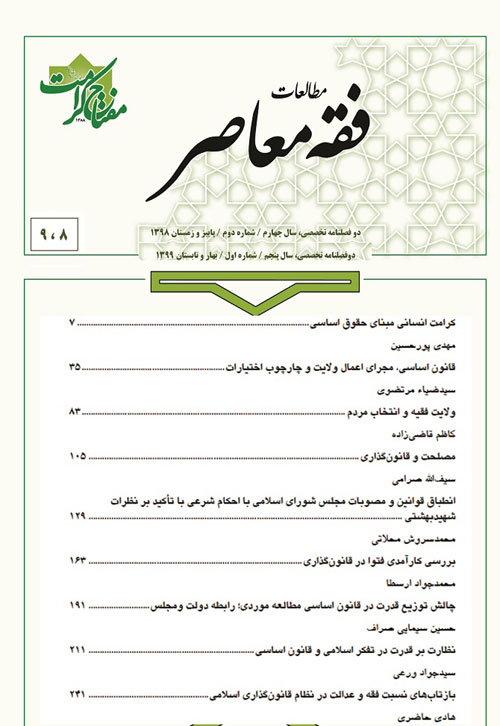Velâyat-e Faqih and the Appointment by the People
In political thought, various theories have been proposed by philosophers about the right of sovereignty and the characteristics of rulers. During the presence of the Infallible Imams (PBUH), the Shiites did not face any theoretical problems regarding the leadership of the society. Unlike the period of occultation, which did not provide access to the Infallible Imam, the necessary conditions of the ruler or leader of the Islamic society and how he was elected have become of special importance. The discussion of Velayat-e-Faqih/ Wilayat al-faqih and Velayat-e-Fuqaha (the Guardianship of the Islamic Jurist/s) is based on narrations in this regard, which seems to refer more to minor Velayat or guardianship such as the guardianship of Ghoy'yab (absentees: is the plural of the word absentee and refers to a person who is absent and cannot be reached), and Ghos'sar (the plural of the word Ghaaser or a person in default and it refers to people like crazy, idiot and child who are legally prohibited from seizing their property) and adjudication, not Velayat or guardianship, which means governing society. In the discussion of the guardianship of fully qualified jurists, the issue of being chosen or accepted by the people has not played an important role and basically, the debate has been about the dignity of the jurists, one of which is the Velayat or guardianship. Disagreement about the meanings and implications of these narrations and their extension to Velayat-e-Faqih as the ruler of society creates many problems and the first problem is the method of choosing a jurist from among the fully qualified jurists and his legitimacy. There are two views on the legitimacy of the Vali-ye faqih in the Islamic government: a) a view that sees Velayat-e-Faqih in government in a broad sense; based on arguments other than narrative arguments or it carries those narrations on a set of conditions, not on a divine appointment. In this view, the choice by the people is a definite and serious matter for legitimacy; b) the second view believes in the general appointment of jurists in the realm of the scope of government. Proponents of this view have to make various justifications for preferring one of these jurists over the other. These justifications also have many problems, some of which are mentioned in the article.
- حق عضویت دریافتی صرف حمایت از نشریات عضو و نگهداری، تکمیل و توسعه مگیران میشود.
- پرداخت حق اشتراک و دانلود مقالات اجازه بازنشر آن در سایر رسانههای چاپی و دیجیتال را به کاربر نمیدهد.


